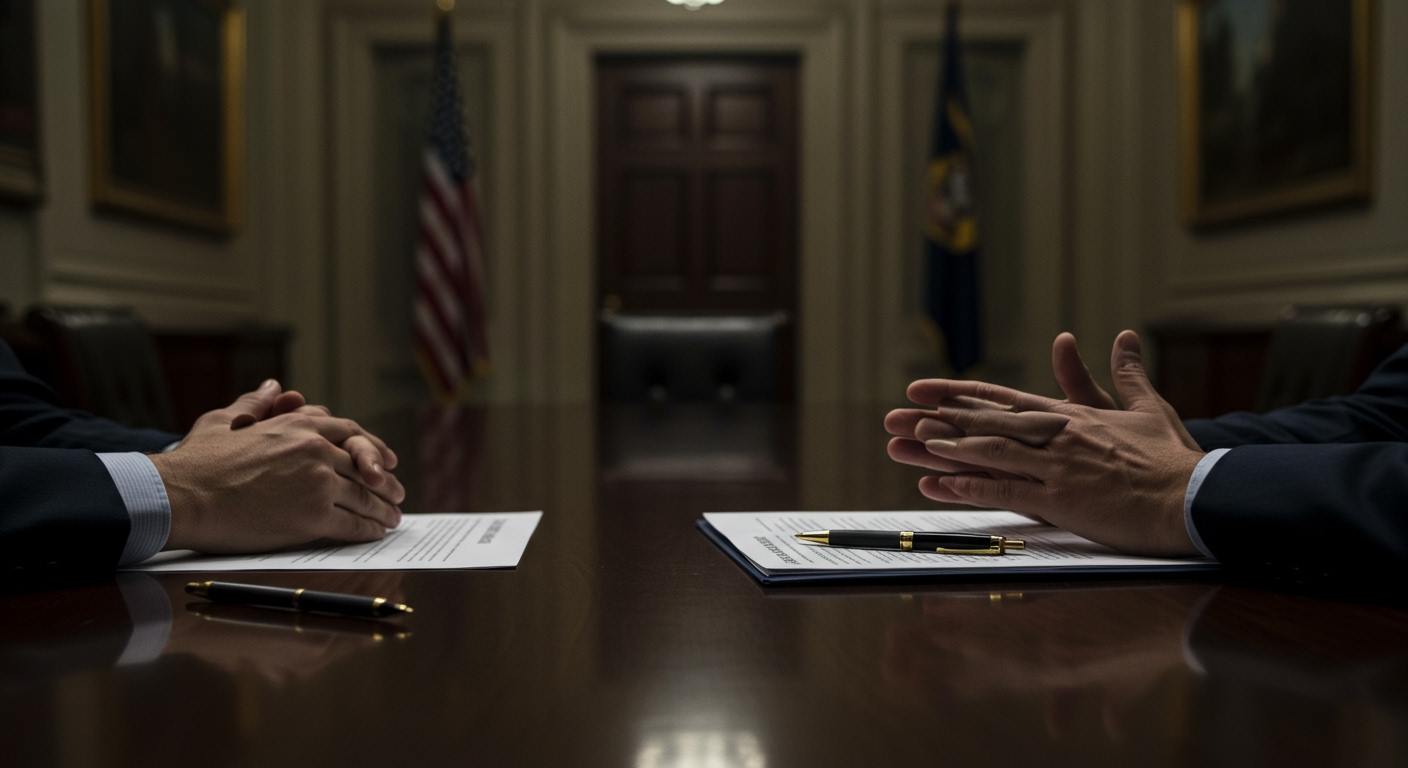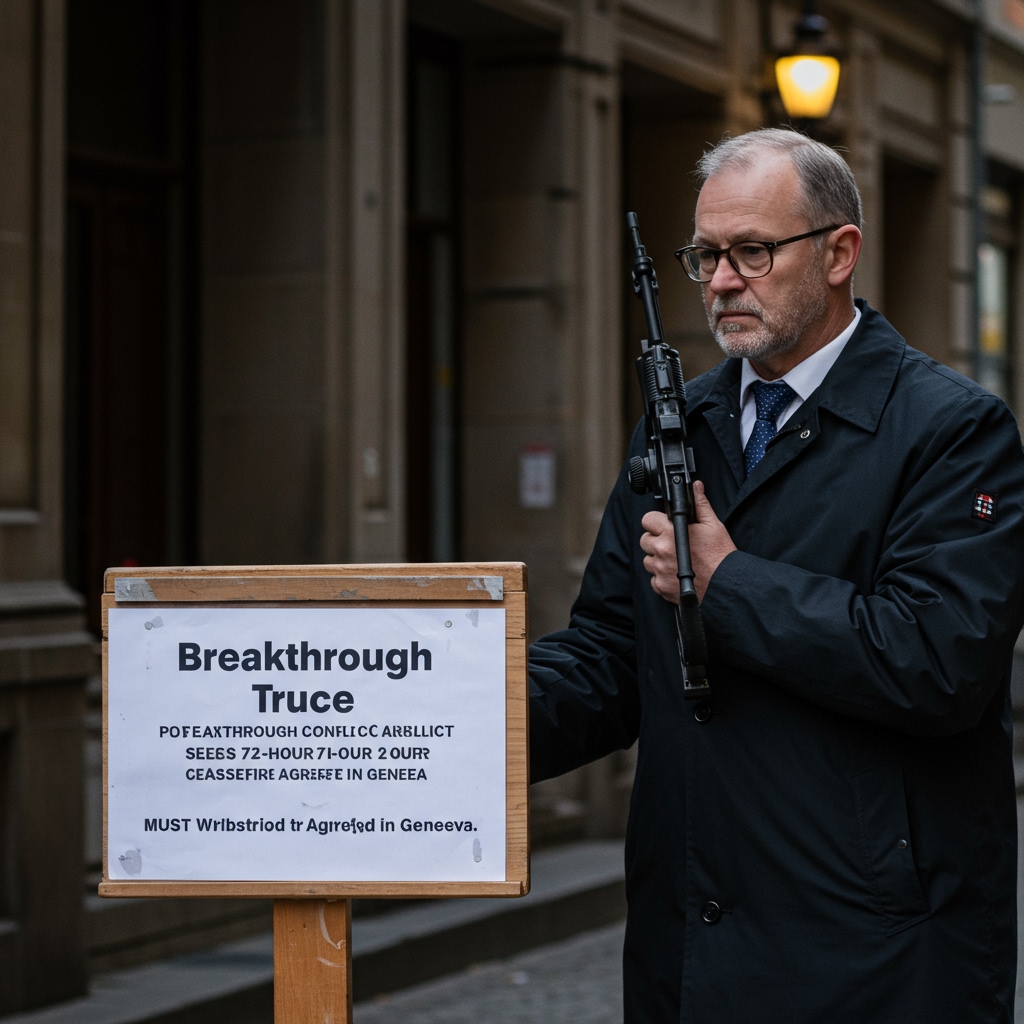GENEVA – A significant step towards de-escalation in the protracted fictional conflict was taken today as representatives from the Fictional Nation A government and the Fictional Rebel Group/Party B signed a landmark ceasefire agreement. The accord, reached after intensive negotiations mediated by the United Nations Special Envoy, Dr. Ben Carter, mandates a comprehensive 72-hour cessation of hostilities across all active fronts. This truce is scheduled to commence on Monday, March 17, 2025, precisely at 06:00 Greenwich Mean Time (GMT).
The signing ceremony, held under the auspices of the United Nations in Geneva, saw Foreign Minister Anya Sharma formally representing the Fictional Nation A government and Commander Kaelen Vos signing on behalf of the Fictional Rebel Group/Party B. Both parties hailed the agreement as a crucial first step, acknowledging the immense suffering caused by the ongoing conflict and expressing cautious optimism about the potential for further progress.
Key Provisions of the Agreement
The 72-hour ceasefire is not merely a pause in fighting but includes several critical humanitarian and confidence-building measures designed to alleviate the plight of civilians and create a more conducive environment for future peace talks.
A central component of the agreement is the immediate opening of two desperately needed humanitarian aid corridors. These corridors are designated to operate in the vicinity of Fictional City X and Fictional City Y, two areas that have been particularly hard-hit by the conflict and where civilian populations face severe shortages of food, medicine, and essential supplies. International aid organizations, already positioned in the region, are expected to utilize these corridors to deliver urgent assistance as soon as the truce takes effect.
Furthermore, the agreement includes a provision for the phased release of 50 prisoners of war. This humanitarian gesture is set to occur over the next week, commencing shortly after the ceasefire begins. The release of prisoners is often seen as a vital confidence-building measure in peace processes, demonstrating a willingness from both sides to take tangible steps towards reconciliation. Details regarding the logistics and verification of these releases are understood to have been finalized during the negotiation process.
The Path to the Truce
The ceasefire agreement is the culmination of weeks of painstaking negotiations facilitated by Dr. Ben Carter, the UN Special Envoy. Operating out of Geneva, Dr. Carter and his team engaged in extensive shuttle diplomacy, bridging significant divides between the government and rebel delegations. The talks were described by observers as challenging, marked by complex issues and deep-seated mistrust built over the course of the conflict.
Dr. Carter praised the commitment shown by both Foreign Minister Sharma and Commander Vos in reaching this breakthrough. “This agreement is a testament to the courage and willingness of both parties to prioritize the well-being of their people,” Dr. Carter stated following the signing. “While this 72-hour truce is a fragile first step, it provides a vital window of opportunity – not only to deliver aid but also to build confidence necessary for a more sustainable peace.”
The Geneva talks focused primarily on the immediate cessation of hostilities and the initial humanitarian steps. The relatively short duration of the ceasefire reflects the delicate nature of the negotiations and the need to test the commitment of both sides to upholding the terms of the agreement on the ground.
Looking Ahead: Negotiations in Bern
The ceasefire agreement explicitly sets the stage for the next phase of diplomatic efforts. Following the conclusion of the 72-hour truce, representatives from the Fictional Nation A government and the Fictional Rebel Group/Party B are scheduled to reconvene for further negotiations. These crucial talks are slated to begin on Thursday, March 20th, 2025, in the Swiss capital, Bern.
Unlike the Geneva discussions, which focused on the immediate truce, the Bern negotiations are intended to delve into the more complex and challenging issues required to forge a potential lasting peace accord. The agenda is expected to include discussions on governance structures, security arrangements, reintegration of fighters, and mechanisms for long-term stability and reconciliation.
The success of the Bern talks will heavily depend on the parties’ adherence to the current ceasefire agreement and their demonstrated commitment to finding political solutions. International focus will now shift to monitoring the implementation of the 72-hour truce and the subsequent progress made in Bern.
Significance and Challenges
This ceasefire represents the most significant breakthrough in diplomatic efforts since the fictional conflict began. While only temporary, it offers a tangible opportunity to provide relief to affected populations and demonstrates that direct negotiation between the parties, facilitated by the UN, can yield results.
However, numerous challenges remain. Upholding the ceasefire across disparate front lines, ensuring the safe passage of humanitarian aid, and guaranteeing the security of released prisoners will require strict discipline and control from the leadership of both Fictional Nation A’s government forces and the Fictional Rebel Group/Party B’s fighters. The history of the conflict is marked by past failed attempts at de-escalation, making sustained commitment crucial.
The upcoming talks in Bern face the formidable task of bridging deep political and ideological divides. Reaching a comprehensive peace accord will require significant compromises from all sides. Nevertheless, the successful negotiation of this initial truce in Geneva provides a glimmer of hope that a negotiated settlement to the protracted fictional conflict may ultimately be possible. The international community will be closely watching the next steps, hopeful that this fragile pause in fighting can pave the way for a durable peace.















